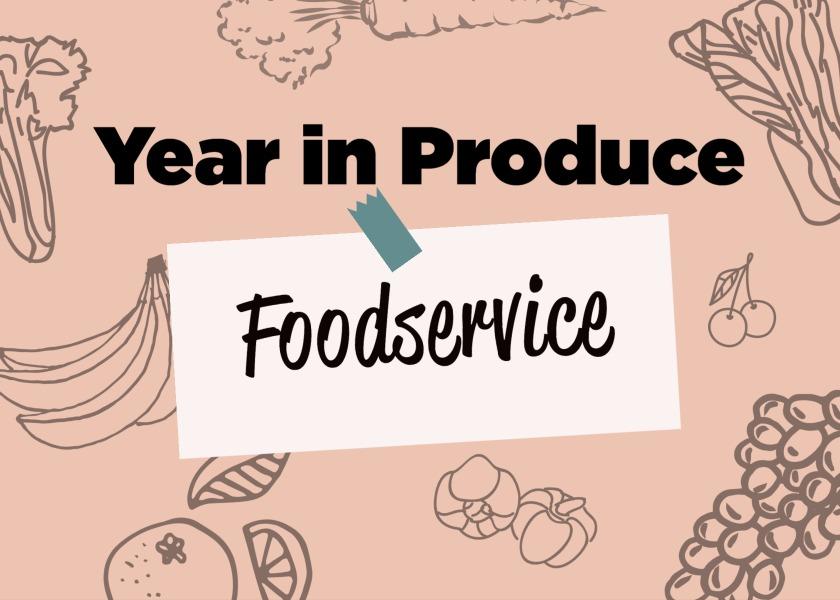Year in Produce No. 2 — When foodservice plummeted, suppliers regrouped

Might as well be blunt about it: Foodservice business tanked since the pandemic gripped the nation.
And that’s devastated growers and wholesalers whose main customers supply restaurants, hotels, entertainment venues, schools, universities and other institutions.
Yet many companies found ways to hang on by seeking new kinds of customers, discovering alternate revenue streams, forming new partnerships, finding aid and repackaging their goods.
Nov. 9
Suppliers still concerned about foodservice sector
By Jim Offner
Potato marketers say they worry about the damage COVID-19 is doing to the foodservice sector.
“Potatoes are now on 84% of restaurant menus,” said Rachel Atkinson-Leach, category and brand manager with Bancroft, Wisc.-based grower-shipper RPE Inc.
“Nearly one in six restaurants closed either permanently or long-term; 40% of operators think it is unlikely their restaurant will still be in business six months from now if there are now additional relief packages from the federal government,” she said, quoting data from the National Restaurant Association.
July 27
Operators ordering less fresh amid COVID-19
By Ashley Nickle
Many foodservice operators are purchasing less fresh product as they reduce their order frequency to adjust for lower demand, according to a recent Datassential survey.
“This is not because they don’t want fresh product,” said Datassential CEO Jack Li, who presented the findings July 21 during a session at the Produce Marketing Association’s virtual event, Foodservice: Delivered. “It’s because the product can go bad.”
Deliveries, he said, used to be every couple of days, but some are each week or even 10 days.
April 27
On LA markets, business falters, especially for foodservice
By Tom Burfield
As with produce suppliers nationwide, Los Angeles distributors that serve the foodservice industry are hardest hit.
Coosemans LA Inc. has suffered a one-two punch: Not only is most of its business with restaurants, but Coosemans specializes in high end, specialty vegetables.
Restaurants that are still open — offering takeout or delivery — aren’t spending a lot of money on seasonal wild mushrooms or wild leeks from the East Coast, said Alan Pollack, general manager.
April 20
Produce rolls with the changes; USDA plans payments
By Tom Karst
With foodservice continuing at a fraction of normal and grocery store foot traffic down sharply compared with normal levels, produce distributors continue to look for ways to alleviate bottlenecks and waste in the supply chain while demand shifts during the COVID-19 pandemic. Agriculture Secretary Sonny Perdue, who appeared on a Farm Journal Live AgDay broadcast April 16, said President Trump is close to announcing a plan for up to $16 billion in direct payments to all ag sectors...
Another $2 billion to $3 billion … would be directed to products from the foodservice industry, moving them to food banks and other nonprofits strained by the pandemic.
April, 6
Foodservice sector scrambles for sales, relief
By Tom Karst
Wholesalers and foodservice distributors are selling to consumers as they scramble to replace millions in lost sales to restaurants because of COVID-19 restrictions in place since mid-March. Pro*Act distributors and their restaurant customers are selling boxes containing a week’s worth of produce directly to consumers.
Customers can order pre-packed boxes of fruit or vegetables that will feed a family of four for a week and can receive the boxes at their vehicle outside restaurants and distributor facilities.
March 23
Baldor delivers directly to consumers
By Amy Sowder
To help alleviate supermarket food shortages due to the new coronavirus COVID-19, Baldor Specialty Foods is making home deliveries available to people in a 50-mile radius of its Bronx, N.Y. headquarters — an area that’s home to 18.5 million people.
Baldor, a fresh produce importer and foodservice wholesaler that has customers in the Northeast and mid-Atlantic, began the service March 18.
With a minimum order of $250, tax and delivery included, Baldor is delivering fresh produce and other food staples.
March 23
Foodservice sector staggered by coronavirus restrictions
By Tom Karst
Suddenly, bars, casual eateries and fine-dining restaurants have nearly vanished. Millions in produce sales have disappeared with them.
Take-out and drive-through business is the total focus for U.S. foodservice operations stung by mid-March coronavirus-related restrictions implemented by federal and state officials.
On March 16, President Donald Trump issued guidelines that called for Americans to avoid social gatherings of more than 10 people and to limit discretionary travel.
Initial economic forecasts from the National Restaurant Association reveal the industry will sustain at least a $225 billion loss and be forced to eliminate 5 million to 7 million jobs from April through June.







